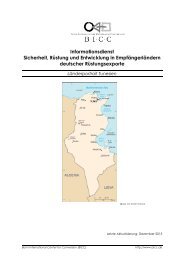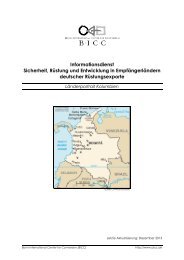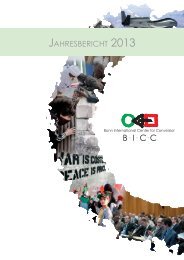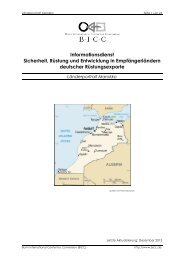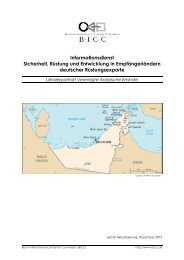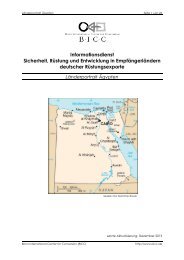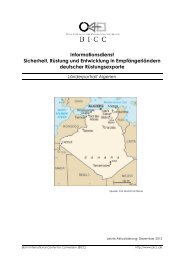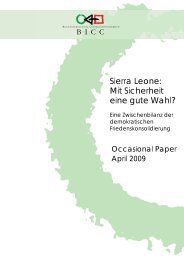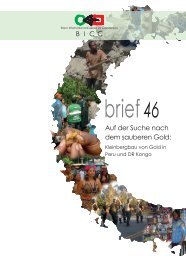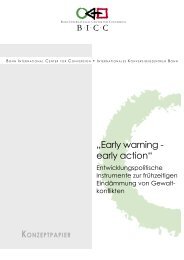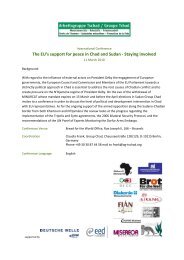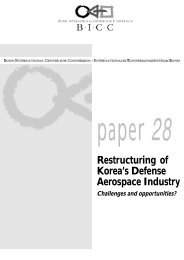English - BICC
English - BICC
English - BICC
You also want an ePaper? Increase the reach of your titles
YUMPU automatically turns print PDFs into web optimized ePapers that Google loves.
ief 22<br />
Matters of Trust:<br />
External and<br />
Internal<br />
Involvement for<br />
Disarmament<br />
Northern Ireland serves as a superb<br />
example of how a peace process<br />
can be influenced and affected by a<br />
complex interplay of exogenous and<br />
endogenous stimuli. External<br />
governmental and non-governmental<br />
actors, and internal players, whether<br />
they be the conflict’s principal political<br />
protagonists or elements of civil<br />
society, have interacted in a manner<br />
that has produced a tenuous division<br />
of labour that has exhibited severe<br />
imbalances during various phases of<br />
the peace process. We would agree that<br />
this interplay, which can be described<br />
as first-, and second-track diplomacy<br />
(Fitzduff, 2001), has been vital in<br />
developing trust and dialogue across<br />
sectarian lines between 1994 and 1998,<br />
and, most importantly, for achieving a<br />
political settlement to the enduring<br />
conflict with the signing of the peace<br />
accord in April 1998. Nonetheless, the<br />
post-Agreement implementation phase,<br />
which can be described as the crucial<br />
second phase of peace-building,<br />
suffered a great deal from the lack of<br />
new impulses for confidence-building.<br />
What happened? An impact of the<br />
Agreement, which can be elucidated as<br />
the top-down effect, curtailed the<br />
flexibility of both external third parties<br />
and internal bottom up initiatives: The<br />
prominent outside facilitator of<br />
negotiations, former US-Senator<br />
George Mitchell, left the stage,<br />
abandoning the Commission on<br />
Decommissioning, which, with a<br />
limited mandate, was grappling with<br />
the most contentious issue of the<br />
peace process. Civil society, after<br />
numerous creative interventions during<br />
the peace talks that were not always<br />
enthusiastically appreciated by local<br />
politicians, including its profound<br />
public appeals in the “Yes Campaign”<br />
that ultimately led to the referendum<br />
of May 1998 (Oliver, 1998), were<br />
deprived of their influence on policy<br />
when the implementation process was<br />
narrowed down to the unproductive<br />
“guns versus government” controversy.<br />
Outsiders: How<br />
neutral can they get?<br />
The specifics of external involvement<br />
in Northern Ireland (Mac Ginty, 1997;<br />
Arthur, 2000; Grove, 2001; Mac Ginty<br />
and Darby, 2002, pp. 106-122)—the<br />
British-Irish guardianship forming a<br />
unique “tandem” model of bipartisan<br />
conflict management inaugurated by<br />
the Anglo-Irish Agreement of 1985,<br />
emergent American interventionism<br />
during the Clinton administration in<br />
response to the impassioned<br />
exhortations of the Irish-American<br />
diaspora, and the Special Support<br />
Programme of the EU since 1994—<br />
have given the conflict a distinctly<br />
58 B·I·C·C<br />
international aura. It is somewhat<br />
paradoxical that a conflict which has<br />
never posed a genuine threat to<br />
international security and never been<br />
subjected to UN mediation or<br />
intervention would become so<br />
internationalised. Outside involvement<br />
in Northern Ireland would prove its<br />
relevance predominantly for the<br />
unsolved domestic security issues of a<br />
protracted low-intensity conflict, and in<br />
particular for the solution of the<br />
impasse surrounding decommissioning.<br />
The most evident examples are George<br />
Mitchell’s brokering role for the peace<br />
accord and the review process of the<br />
Agreement in autumn 1999, the<br />
Agreement’s provision for independent<br />
international commissions on<br />
decommissioning and policing, and the<br />
role of the international inspectors<br />
visiting IRA arms dumps since summer<br />
2000.<br />
The manner in which a concert of<br />
powerful outsiders assumed<br />
guardianship of the peace process<br />
should not necessarily be equated with<br />
genuine third party intervention. Most<br />
external actors chose to adopt an<br />
approach emphasizing facilitation<br />
rather than intervention; the<br />
“neutrality” of third parties was<br />
regularly contested by local politicians<br />
in Northern Ireland; “they had to be<br />
approved by the British and Irish<br />
governments and yet retain enough<br />
distance from the governments to be<br />
regarded as truly independent” (Mac<br />
Ginty and Darby, 2002, p.120).<br />
Nationalists and Republicans have,<br />
above all other groups, demonstrated<br />
an ardent determination to<br />
internationalise the conflict. The<br />
premise upon which this position has<br />
been based is that the ultimate<br />
overarching political goal of a united<br />
Ireland can only be achieved with Irish<br />
and US involvement in the peace<br />
process. In contrast, Unionists and<br />
Loyalists, endeavouring to reaffirm<br />
their British identity, have been wary of<br />
placing faith or trust in initiatives



